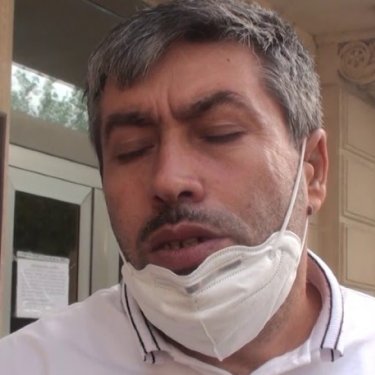Opposition reporter convicted on trumped-up hooliganism charge

Reporters Without Borders (RSF) calls on the Azerbaijani authorities to quash last week’s conviction of opposition reporter Tezehan Miralamli, the latest victim of a long-established government practice of fabricating cases against critical journalists in order to neutralize them.
Employed by Azadlig, the only remaining opposition newspaper, Miralamli was convicted of “hooliganism” under article 221.1 of the penal code on 19 June, in yet another attempt by the government to give its persecution of critics a semblance of legality in the international community’s eyes – something it has been doing for years, especially since joining the Council of Europe in 2001.
Convicted by a Baku court of hitting an alleged blogger – who was clearly used by the authorities – in an altercation on 26 February, Miralamli has been sentenced to wear an electronic bracelet and stay at home every night from 11 p.m. to 7 a.m. for the next 12 months. He says this will obstruct his reporting by preventing him from covering night-time events or events outside Baku, and by placing him under constant police surveillance.
“What with arrests, physical attacks and jailing family members, the authorities have been harassing Tezehan Miralamli for eight years for his reporting and his political views,” said Jeanne Cavelier, the head of RSF’s Eastern Europe and Central Asia desk.
“For these reasons, we ask the Azerbaijani judicial system to get these charges dropped. We also urge the Council of Europe’s Commissioner for Human Rights, Dunja Mijatović, to condemn the use of trumped-up charges and the Council of Europe’s Committee of Ministers to condition Azerbaijan’s participation in its institutions on respect for its obligations and undertakings.”
The European Court of Human Rights already ruled against Azerbaijan in 2015 and 2016 in two cases involving Miralamli that were not directly linked to his journalistic activities. Last April, Miralamli was detained by the police for several hours after interviewing Ali Karimli, the head of the opposition Popular Front Party, with whom he is close.
Trumped-up charges of physical violence have often been used to jail critical journalists in Azerbaijan. The victims of this technique include Seymour Khazi – who used to write for Azadlig and went on to present the exile broadcast Azerbaycan Saati – who spent five years in prison on similar charges.
Ganimat Zahid, the editor of both Azadlig and Azerbaycan Saati, was jailed for more than two and a half years, from 2007 to 2010, for supposedly attacking a woman. Azel.tv news website editor Afgan Sadykhov was accused of “aggravated assault” in November 2016 after he responded to a summons by local officials and, on arriving at the meeting place, was attacked and punched by a woman who then filed a complaint against him.
Journalist Elchin Hasanov was convicted of hooliganism in 2016 after being physically attacked and filing a complaint against his assailant, while the blogger Mehman Huseynov, who was jailed for defamation in 2017, was charged with hooliganism a few months before his release in 2019.
The authorities also fabricate tax evasion charges. Khadija Ismayilova, a well-known investigative journalist, was sentenced to seven and a half years in prison in 2015 on absurd charge of “large-scale embezzlement,” “illegal trade,” “tax evasion” and “abuse of authority.” She was released as a result of international pressure but was ordered to pay 45,143 manats (around 23,000 euros) in bogus back taxes in 2018.
The police also readily resort to the Soviet-era ploy of “discovering” drugs, firearms or even banned books during searches. “Drug trafficking” was the main charge on which Hilal Mammedov, the editor of the Talysh-language newspaper Tolishi Sado, was sentenced to five years in prison in 2014.
This constant persecution is the reason why Azerbaijan fell another two places in RSF's 2020 World Press Freedom Index and is now ranked 168th out of 180 countries. The leading critical media outlets have been silenced or have had to relocate abroad, the main independent websites are blocked and at least five journalists are currently in prison.



